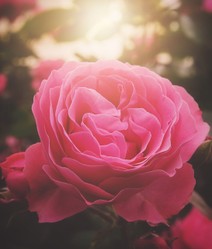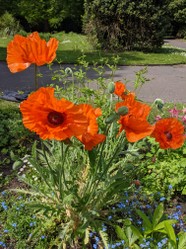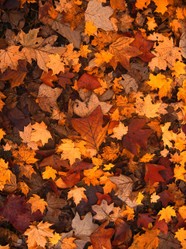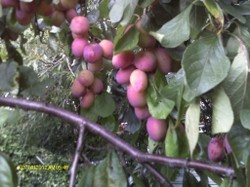Skymeadow is a small triangular plot situated where the rolling lands of the English Midlands slope down to the flat terrain of East Anglia. Unlike much of East Anglia, whose soils vary from sandy heath to organic peat Skymeadow has the heavy clay soils of the East Midlands. There were advantages and disadvantages to this, as the clay is hard to work but is richly fertile. This shaped Hart's gardening, for such soils are usually handled by the plough, but the land had not been ploughed for many years. Essentially the farm had been a much loved hobby farm that fed its previous owners to some degree. It was ripe to be turned into an expansive garden.
The area is, like much of South East Britain, drier than the west of the country, as it is further from the prevailing Atlantic winds that soak us in the West.But the drier and colder easterlies afflict it.While water is not currently a problem, Hart had to consider his water usage and retention.
As one who works a small plot I was initially baffled by how he would manage seven acres while keeping down a job. But Hart minimised his work by planting trees.He inherited a small, productive orchard with plums and apples, but augmented his facilities with a wider range of tree, including cherries, gages and figs. He also installed a long hawthorn hedge. He speaks of his elm hedge. This is interesting as Dutch Elm Disease has all but wiped out the elm in England, but it seems that the disease only strikes at a certain level of maturity, so the elm survives as a bush. This is interesting information.
Flowers are a major crop, and he has worked diligently to plant roses in many of the flower beds.This is in memory of his childhood home, a farm not far north of where he now dwells. A range of other flowers has gone into the garden, including snow drops. I notice that his use of bulbs indicates a decision to opt for lower maintenance. This is how he manages seven acres!
A productive vegetable garden is found at Skymeadow, and the author keeps a number of animals, including dogs, cats and chickens. The cats are maintained to deal with the perennial problem of mice Skymeadow is a garden where wild life is welcomed, and there is a badger sett in a quiet corner of the garden.A range of wild birds can also be found.
Yet Skymeadow is a family garden where space for children to play is important, there being a small football pitch for his son Isaac. We see therefore that the garden is a wide use of space whose management makes room for all stakeholders. Thus family life is not being neglected, and this is a great positive, as Hart shows that he is not indulging his gardening obsession at the expense of others.






 Pilgrimage. A review22 days ago
Pilgrimage. A review22 days ago
 Leo the Fourteenthon 05/09/2025
Leo the Fourteenthon 05/09/2025
 The Melsonby Hoardon 03/25/2025
The Melsonby Hoardon 03/25/2025




Comments
Missing question here
Thank you for your comment below in answer to my previous observation and question.
No, there are no constraints on what can be done with biodegradable CONTAINERS.
Thank you for your comment below in answer to my previous observation and question.
Some Unitedstatesians appreciate biodegradable containers for in-ground, outside transplants, particularly of what can be eaten when mature.
Your answer generally associates such containers with plant propagation.
Would that plant propagation be more for research and in business than individually and home gardening-wise?
In Britain large biodegradable containersvarevrare, but small ones are common. They are mainly used for plant propagation.
Thank you for your comment below in answer to my previous observation and question.
This is a related, unrelated question in that it's prompted by your answer Jan. 7, 2020, invoking container-planting.
Some Unitedstatesians like to plant plants always in biodegradable containers.
Might you plant a transplantable plant in such a container or would your always prefer unconfined transplants?
Yes, not every writer is a talented photographer.
I like the idea of using fewer words. Unfortunately, for the internet fewer words seem less likely to rank with Google. As for drawings in lieu of photographs, that is sometimes best, since finding the right moment to capture with a ca,era is often difficult.
It is always good to hear from you Derdriu.
The author did soil modification with leaf mould, some sand and compost. Non-clay tolerant plants, such as carrots, were grown in containers.
The cantankerous solitary gardener is known by his inability to get on with others.I once sat on an allotment society disciplinary panel dealing with such a guy who simply could not get on with others. He was blocking paths between plots with his bike and refusing to move it. I let him off lightly because those he had annoyed were his accusers, and I suspected that truth was not being fully told and that he was being set up.
Merely liking to be alone with your garden is not the mark of this type of person. .
frankbeswick, Thank you for the practicalities and products.
Do the plantings match the soil or does the author modify in order to have other than clay-tolerant plants?
It's intriguing your parting mention of the "solitary gardener, a type of generally cantankerous male whom we have all encountered." How would I recognize that type: argumentative, opinionated about pest controls and watering times, unmannerly, unsmiling?
When I think of gardeners who've had to be solitary some or much of the time, I think of my grandfather, enjoying every minute of his short life in his grapefruit orchard and quoting Browning and Keats.